Coronavirus – EUI impact survey results



A survey on the impact of COVID-19 on European Universities has been released.
Brussels, May 2020. The European Commission has published the main conclusions from a May 2020 survey with the 114 higher education institutions taking part in the first 17 European Universities.
The survey was run to better understand the way European Universities jointly address common challenges brought by the crisis but also to grasp the extent to which being part of a European University has contributed to alleviate such impact.

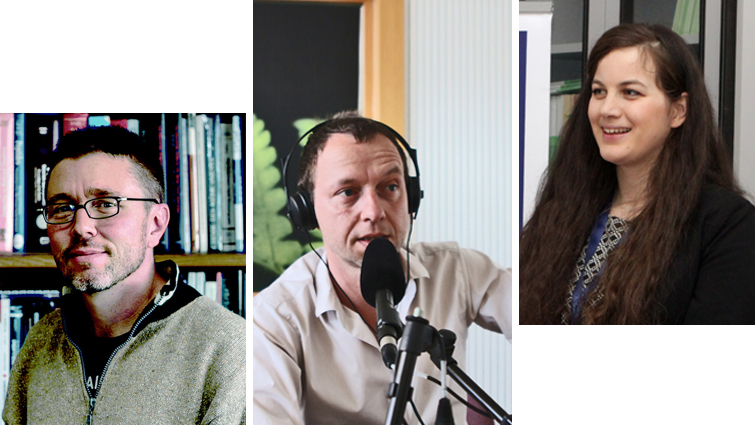
Berlin, 22 June 2020. The proposal to condense some of the interviews conducted with university staff, students, administrators and experts about the EU-funded European Universities Initiative — and about modern university development in general — resonated well in the educational radio magazine “Campus & Karriere” of Germany’s national radio channel Deutschlandradio.

Episode 3:
The university alliance CHARM-EU presents itself. Our reporter speaks with Katalin Németh, internationalisation officer of Eötvös Loránd University in Budapest, and Gilles Subra, researcher and coordinator at the University of Montpellier. Both universities are members of the CHARM EU Alliance. The alliance’s structural feature of inter-university work packages and task forces is being explained.
UUU wants to thanks all alliance members and all you beautiful people of being so frank and patient and available to explain, especially in these stressful times of restrictions, home office and online work. Thanks to you it was possible to make this radio programme and to develop an interesting format that mirrors and accompanies the alliances’ genisis.
The producers of the programme – who are part of the creative process just like all the interview partners – are, apart of the author Tino Brömme, sound and editing genius Andreas Hagelüken in Freiburg who normally produces sophisticated radio plays and sound installations (randfunk). Also aboard are the two German voices Marco Höhmann, an actor, commedian and project manager, as well as the brilliant Matia Sprenger who just finished her high school diploma with honors.
The upcoming episode of the radio series will feature Daniela Trani from the alliance YUFE, and Dominic Orr from YUFE associate partner KIRON Open Higher Education.
 Photos for social media can be downloaded here: Ep. 1 Forlino | Ep. 2 Maria & Genís | Ep. 3 Gilles and Katalin | Podcast studio with author Tino Brömme
Photos for social media can be downloaded here: Ep. 1 Forlino | Ep. 2 Maria & Genís | Ep. 3 Gilles and Katalin | Podcast studio with author Tino Brömme

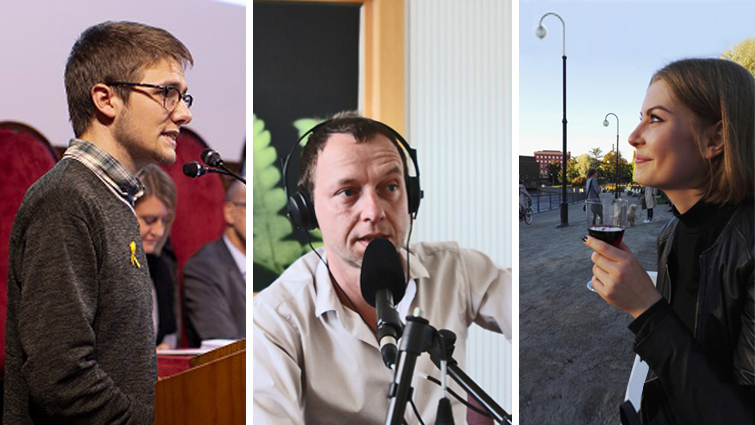
UUU has launched a radio programme on German national radio – Deutschlandradio – presenting and discussing European Universities. The second of four episodes has now been aired.
Berlin, 17 June 2020. June has been a good month for the United Universities of Europe project (UUU). The proposal to condense some of the interviews conducted with university staff, students, administrators and experts about the EU-funded European Universities Initiative – and about modern university development in general – resonated well in the educational radio magazine “Campus & Karriere” of Germany’s national radio channel Deutschlandradio.

Episode 2: A conversation with two students, Maria Michailova, Russian exchange student at the University of Tampere, Finland, a member of the alliance ECIU, and with Genís Vives, student representative at the University of Barcelona, a partner of CHARM-EU. The students show how drastically different was (and is) the emergency situation under Corona restrictions in different countries.
The producers of the programme – who are part of the creative process just like all the interview partners – are, apart of the author Tino Brömme, sound and editing genius Andreas Hagelüken in Freiburg who normally produces sophisticated radio plays and sound installations (randfunk). Also aboard are the two German voices Marco Höhmann, an actor, commedian and project manager, as well as the brilliant Matia Sprenger who just finished her high school diploma with honors.
The upcoming episodes of the radio series will feature Katalin Németh, internationalisation officer of Eötvös Loránd University in Budapest (CHARM-EU), and Gilles Subra, researcher and coordinator at the University of Montpellier (UNA EUROPA); Daniela Trani from the alliance YUFE, and Dominic Orr from YUFE associate partner KIRON Open Higher Education.
 Photos for social media can be downloaded here: Ep. 1 Forlino | Ep. 2 Maria & Genís | Ep. 3 Gilles and Katalin | Podcast studio with author Tino Brömme
Photos for social media can be downloaded here: Ep. 1 Forlino | Ep. 2 Maria & Genís | Ep. 3 Gilles and Katalin | Podcast studio with author Tino Brömme

The University of Granada, member of the university alliance ARQUS, “tele-gathered” 70 members of its Orchestra and Choir to record the Gaudeamus of Resistance with a verse dedicated to the current situation caused by COVID-19. It has been subtitled in 13 languages thanks to the support and solidarity of its international partners.
Arqus, 30th April, 2020. The Gaudeamus Igitur has been for centuries the anthem and a symbol of universities and their academic communities in a huge number of countries all over the world.
Its nature has always been to be alive and its lyrics have never been static. Some of its verses were adjusted and modified whenever it was deemed relevant to reflect change in society and in the academic world. When the pandemic started, the University of Granada brought together more than 70 members of its Orchestra and Choir to record an online version of the anthem that includes a dedicated verse of resistance against the SARS-CoV-2 virus causing the COVID-19 crisis.
Jesús Luque Moreno, who is an honorary Emeritus Full Professor of Latin, proposed updating the anthem to fit the reality in which we currently find ourselves, and wrote the additional verse that inspires strength and hope, and emphasizes the certainty of victory over the coronavirus.
Almost 20,000 people from more than 15 countries have already viewed the original version, sung in Latin and subtitled in Spanish. Due to its success, the University of Granada decided to subtitle it in 13 additional languages so that people across the globe could enjoy and understand the strong and meaningful lyrics.
Subtitling the Gaudeamus anthem to 13 more languages, including all the languages of the Arqus Alliance, has been possible thanks to the voluntary contributions of academic and administrative staff of the University of Granada, and the collaboration of international partners, in particular, those that make up the Arqus Alliance. These efforts were promoted and coordinated by the University of Granada’s Vice-Rectorate for Internationalization.
The recording of the Gaudeamus has been possible thanks to the enthusiasm of 45 musicians and 26 choristers. All of these musicians used their own resources at home to record each part separately, and then they were adjusted, edited, mastered and equalised by the production team. Approximately 75 parallel audio and video tracks have been used for the final video. It has been an unprecedented challenge both artistically and technically.
The Gaudeamus of Resistance and its international versions are, in summary, a collaborative work that overcomes borders and restrictions and makes use of the best we can offer. It shows that international cooperation can help to throw off chains and stand by each other.
Source: https://www.arqus-alliance.eu/news/arqus-supports-granada-Gaudeamus

EUA has published the position “The future of the European Universities Initiative – the sector’s perspective” together with the results of the recent EUA survey on international strategic institutional partnerships and the European Universities Initiative.
Endorsed by the EUA Council, the position supports the initiative and calls for it to remain open and flexible, so that it allows universities to grow and deepen their cooperation according to their strategy and priorities. The Initiative should also be used as an additional way to address obstacles to transnational collaboration and work towards greater compatibility of systems across Europe building on and embedded in the work in the framework of the Bologna Process and the European Research Area.
European collaboration and solidarity, including in research, innovation and education are of ever greater importance in the current coronavirus crisis. Strengthening Europe’s innovation capacity, to which universities contribute greatly, will be crucial for recovery and for building a sustainable future. Deepening transnational university collaboration, including through alliances such as those developed under the European Universities Initiative, can play an important role in this and has great potential to strengthen European higher education and research and its international competitiveness.
In the position, EUA calls on the European Commission, the EU Member States in Council and the European Parliament to consider the following seven points for the future development of the initiative:
The position is founded on consultations with national rectors’ conferences and evidence from the sector included in the EUA report “International strategic institutional partnerships and the European Universities Initiative: results of the EUA survey”, which has also just been published. It was conducted with universities in early 2020 to map the state of play of their international engagement, explore in particular the topic of international strategic institutional partnerships and collect views about the European Universities Initiative. EUA received 219 valid responses from higher education institutions in 34 systems across Europe. The results confirm that international collaboration has been a strategic issue for universities for a long time and developing long-term strategic institutional partnerships with a selected number of partners abroad is high on the list of internationalisation priorities.
The European Universities Initiative, which aims at supporting the creation of such deep university alliances, has thus triggered high interest among responding institutions. While the results highlight the benefits that respondents are expecting from participating in the European Universities Initiative, they also reveal challenges and reasons why some institutions decide not to participate and give recommendations for the future.
The survey results and the EUA Council position outline the sector’s views and demands for the future development of the initiative. They come at a crucial moment when decisions are being taken on future EU funding programmes, amid the current coronavirus crisis.


This year’s Work Programme for Horizon 2020, published on March 25, finally enables European University Alliances to apply for EU research funding. Both groups are invited to put forward their applications – the 17 alliances that were successful in the first funding round in 2019, and the upcoming 24 alliances of the second call. The grants, of an estimated average of € 2 million per alliance, will support activities in the field of research and innovation:
The European Commission expects a “tangible progress towards the institutional transformation of universities” and models to make it easier in the future to combine Horizon Europe and the Erasmus+ Programme. The European Universities alliances are encouraged to identify additional funding sources at European and national levels, to facilitate the implementation of their activities.
Further funding is available for the university alliances for the construction of “Knowledge Ecosystems” (page 75) and other measures such as gender equality in science.
The Horizon 2020 work programme: https://ec.europa.eu/research/participants/data/ref/h2020/wp/2018-2020/main/h2020-wp1820-swfs_en.pdf
H2020 Programme Guidance document. Support for the Research and Innovation Dimension of European Universities: https://ec.europa.eu/research/participants/data/ref/h2020/other/guides_for_applicants/other-doc_h2020-iba-swafs-support-1-2020_h2020-iba-swafs-support-2-2020_en.pdf


(Press Release) Europe’s universities should strive to be places of outstanding research and educational innovation. More flexible study and research offers and fewer bureaucratic hurdles can ease the individual educational and career paths of students, doctoral candidates, researchers, and staff. As an institution that actively shapes the European educational area, TU Berlin, together with six European partner universities, is taking part in the second call of the European Commission’s “European Universities Initiative”. As coordinating university, TU Berlin submitted the proposal for “ENHANCE – European Universities of Technology Alliance” on 26 February 2020. The Alliance is made up of seven European innovative technical universities: Chalmers University of Technology (Sweden), Norwegian University of Science and Technology (Norway), Politecnico di Milano (Italy), RWTH Aachen University and Technische Universität Berlin (Germany), Universitat Politècnica de València (Spain), and Warsaw University of Technology (Poland). Successful alliances will receive 120 million euros and serve as role models for future European universities, for which the new Erasmus program will provide a special funding line.
With a vision to “drive responsible societal transformation by enhancing a strong alliance of European Universities of Technology, empowering people to develop and use science and technology responsibly and turn global challenges into opportunities”, the ENHANCE partner universities aim to use the three-year funding period to lay the foundation for structures which enable the seamless mobility of students, researchers, and employees of the universities. Their plan includes a recognition database and a mapping of study offers so that students can select study offers and modules from within the Alliance with the assurance that these will receive automatic academic recognition. The envisioned instruments will first be tested in select bachelor’s and master’s programs. Additionally, the implementation of innovative teaching and learning formats will enable all students to profit from international ENHANCE offerings. For example, students will be able to take online courses offered by the partner universities, virtually work with other students on projects, or participate in workshops and summer schools.
Value-based teaching offered in collaboration with social players will ensure that students learn to critically think and develop and apply knowledge and technologies for the benefit of society. As a coalition of technical universities, one focus of ENHANCE is also on sustainable innovation and entrepreneurship. In a first step, joint research will be conducted to investigate what support start-ups need to be economically and ecologically viable long term.
“After a very constructive application period, we are looking forward to the results of the competition,” says Professor Angela Ittel, vice president for strategic development, junior scholars, and teacher education at TU Berlin. “We have set ourselves ambitious goals and I am convinced that the European University Initiative will elevate our cooperation with partners to a new level. We are already working closer together than ever before.”
Source: www.pressestelle.tu-berlin.de

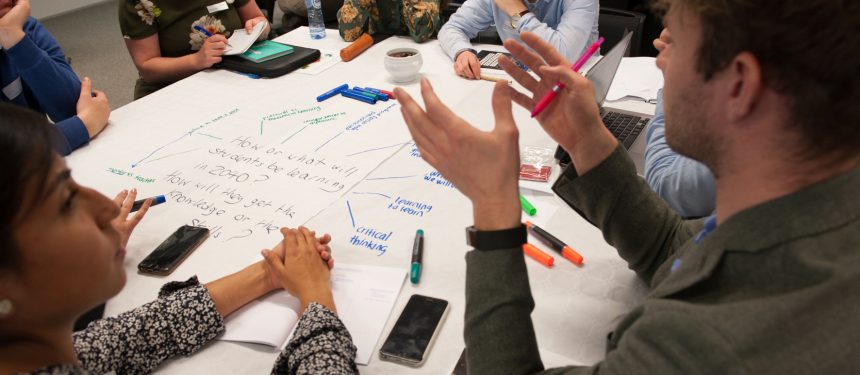
“We are all very optimistic about it. We see it as a great opportunity to create a truly European university model,” says Seán Hand, deputy pro-vice-chancellor of the University of Warwick in the UK.
He is enthusing over a newly forged bond with partner universities in Brussels, Barcelona, Gothenburg, Paris, and Ljubljana.
The alliance, called EUTOPIA, is one of 17 others supported by the EU – each European University alliance receives €5 million in the first three years and will work to become models of European integration: “inter-university campuses” around which students, doctoral candidates, staff and researchers can move seamlessly.
“We would have pursued many of the planned cooperative projects anyway,” explains Luke Walton, international press manager at Warwick. “But the EU call has encouraged us even more to further enhance our focus on Europe as a key part of our internationalisation strategy.
“It offers a framework, some funding and a public platform to put a sustainable collaboration in place.”
Bartosz Brozek in Kraków is driven by the same pioneering spirit. As vice-dean for international relations, he manages the Jagiellonian University’s projects within the seven-member group UNA Europa.
“The EU money is not even essential,” he stresses. “All of us are committed to working together as one future university. And we are starting by creating a common identity.”
The origins
The enthusiasm for the ‘European Universities Initiative’, launched by the European Commission in late 2018, was huge from the very beginning. A thousand participants, internationalisation officers, vice-rectors, ministerial delegates and representatives of research organisations, joined the information session in Brussels before Christmas either in person or via a video link.
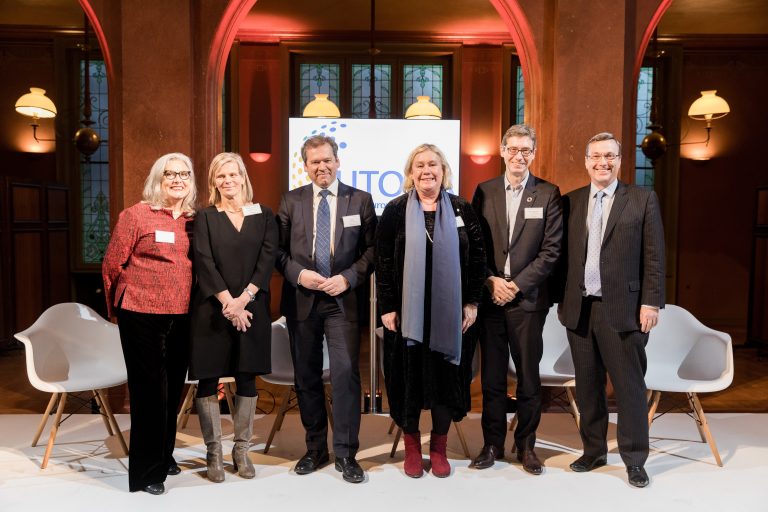
Over 300 institutions from 31 countries — that is one in 10 of the approximately 3,000 universities in the European Union — had formed 54 networks and submitted their proposals by February. Eventually 17, comprising 114 institutes, were selected in June.
The European Universities project, first pronounced in autumn 2017 by the newly elected French President Emmanuel Macron in his Sorbonne speech, has been hailed as nothing less than a “renaissance of the European spirit.”
“He didn’t have a very precise agenda,” recalls François Taddei, who is a counsellor for the 4EU+ alliance of six partner universities — Charles, Heidelberg and Sorbonne Universities, and the Universities of Copenhagen, Milan and Warsaw.
“But he is someone who deeply believes in Europe and in education, and who believes that universities are the place where discussions can be happening. He was clever enough not to over-prescribe, feeling that there was an interesting potential there.”
The idea originated, according to education journalist Jan-Martin Wiarda, in the European department of the Elysée Palace, and had to be elaborated by the research ministry. Some in the French government, says Wiarda, claim that Macron’s wife Brigitte Trogneux inspired it.
Twenty French universities will receive €100 million over 10 years
Higher education and research minister Frédérique Vidal said in retrospect: “We already agreed in the election campaign that universities and research institutions will play a central role in reconciling citizens with Europe.”
Making it in the first round
“We lost out in the first round by one point,” explains Ludovic Thilly, professor at the University of Poitiers and Executive Vice-Rector in charge of European affairs. He coordinates the European Campus of City-Universities, or EC2U, with Coïmbra, Iasi, Jena, Pavia, Salamanca, Turku and Poitiers in the boat.
“Our EC2U Alliance was ranked 18th, so that was very frustrating… Fortunately, we got a score of 80/100, i.e. we reached the score of excellence, and thus we are supported by the French government. This will greatly help with preparing the best resubmission.”
The selection was made by an evaluation committee, based on the advice of 26 independent external experts whose names were not made public. Each proposal was assessed by three of them against the five necessary criteria: relevance, geographical balance, quality of the proposal, quality of the cooperation arrangements, sustainability & dissemination.
Thilly, who recently attended an EU information session in Brussels, said the Commission considers funding alliances selected in the first and second round for a three-year period with the possibility to apply for a four-year extension.
After that, they are supposed to be self-sustaining. From 2021, when the Initiative becomes part of the Erasmus+ program, subsidies for four years with the possibility of a three-year extension are under discussion.
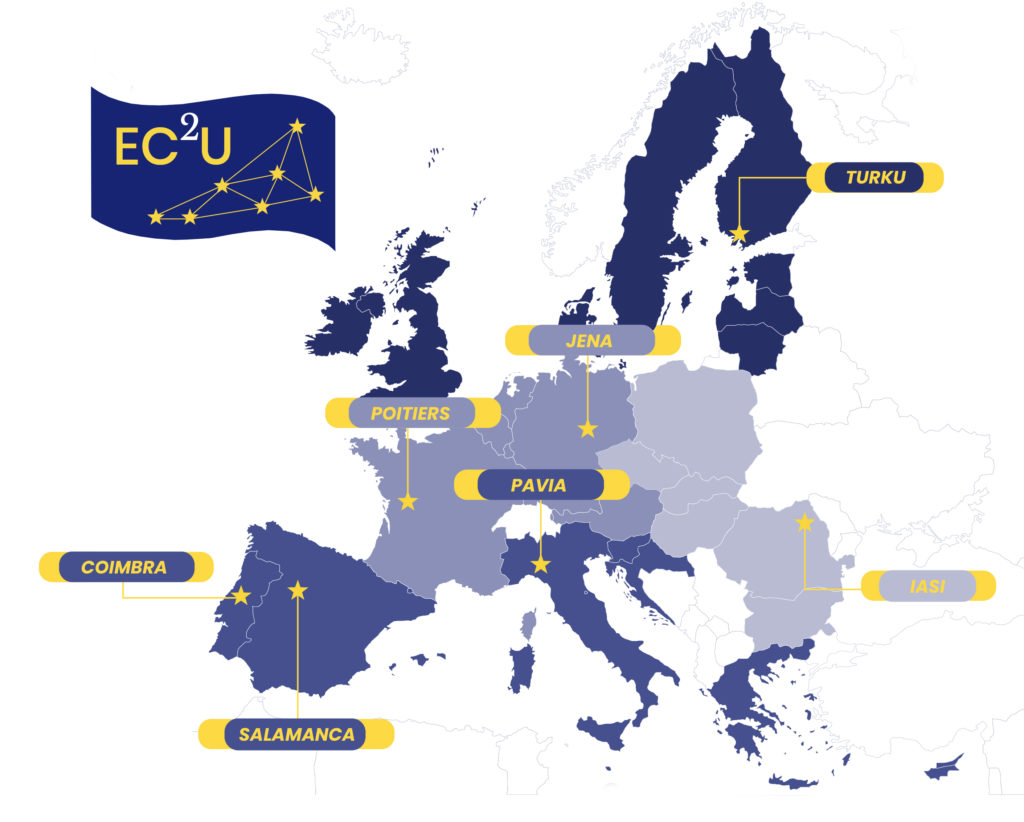
The financing
“Five million euros for three years per consortium is not very much,” Frank Petrikowski, a policy officer for the German Federal Ministry of Education and Research, BMBF, told ESNA European Higher Education News in Berlin. The first mentioned budget was €30 million, it was raised to €60 million and finally set at €85 million for 17 – instead of 12 – chosen consortia.
He hopes that the European Universities will be “a counterweight to Harvard and Stanford”
“It is planned to go even further to €120 million in the second round,” he reveals. “€1.3 billion has been earmarked as a separate pillar of the Erasmus+ program in the forthcoming MFF from 2021 to 2027.”
Secondly, some governments are committed to provide additional money. French and German universities scored highest in the first round of the competition, appearing in 16 and 14 successful alliances respectively.
Paris will support “very well evaluated projects” with a focus on “research and innovation” as well as “other activities which are not eligible for European funding on national territory.” Twenty French universities will receive €100 million over 10 years. Among them are four universities; the above-mentioned University of Poitiers, as well as Orléans, Troyes, and Lille — whose alliances were unsuccessful in the first round.
The Germans have set up a national support programme of €7 million over three years; this also includes universities that didn’t win the first bid and might even not win the second, but that scored high in the Commission’s evaluation.
Rattling the rankings
Harald Kainz, rector of the Technical University of Graz, which is a member of the university alliance ARQUS, hopes that the European Universities will be “a counterweight to Harvard and Stanford.”
Patrick Aebischer, former President of the École polytechnique fédérale de Lausanne (EPFL), went even further, saying at a conference in Munich that the Initiative should focus on a few top universities in order to create a European Ivy League after the American model.
Olga Wessels, Head of the Brussels’ Office of the ECIU University — the biggest of the alliances with now 14 member universities — makes no bones about it: “Especially after Brexit when the UK is leaving the EU, if you look at the rankings, there are not many highly ranked European universities. So we need to build competitiveness of the universities.”
So far, the advantage of internationally high ranking European universities is marginal. Among the 114 alliance members successful in the first round of the programme, only 18 are in the top 200 of the Shanghai ranking, 25 in the QS ranking and 26 in the Times Higher Education ranking.
Can the incentives for merging ever be big enough for a university to give up its autonomy? Or, under what conditions would international ranking companies consider a European University one institution? Phil Baty, editor of the THE World University Rankings, told ESNA: “It is very unlikely that we would treat such a consortium or alliance as a single entity—we tend to look at the legal entity when considering how to rank organisations.”
Kinds of innovation
The call’s specifications were patched together by the EU agency EACEA in a consultation process with the higher education and research sector. Unsurprisingly, they bear the mark of research-intensive universities with strong industry relations in need of ‘innovation’, ‘excellence’ and ‘entrepreneurship.’
An interesting plan of YUFE is furnishing special homes where students can live for free during their stay
The networks have been given catchy names such as EUTOPIA for European Universities Transforming to an Open, Inclusive Academy for 2050, or EDUC, short for European Digital UniverCity, or UNITE! as an acronym of University Network for Innovation, Technology and Engineering.
ECIU University, the European Consortium of Innovative Universities, is less catchy but interesting for its statement that it “is determined to change the way of delivering education from degree-based to challenge-based”.
Beyond the compelling names, there are many pedagogically interesting projects, of network-building experiments and of activities that involve students, citizens and local companies.
One is a multi-campus joint master’s course of the alliance CIVICA. The course forms “European knowledge-creating teams” which concentrate on four research topics.
The alliance with members from France, Germany, Hungary, Italy, Romania and Sweden, including the private business school Hertie School of Governance in Berlin, also organises a trans-European arts and sports tournament.
CharmEU includes the University of Barcelona and Montpellier, Utrecht and Eötvös Loránd University and Trinity College Dublin; they are not the only alliance planning multilingual courses and language-learning support for the participating students. But they are particularly ambitious in exploring exemplary collaboration models—a joint-governance model, guidelines for joint degrees and an open science agenda.
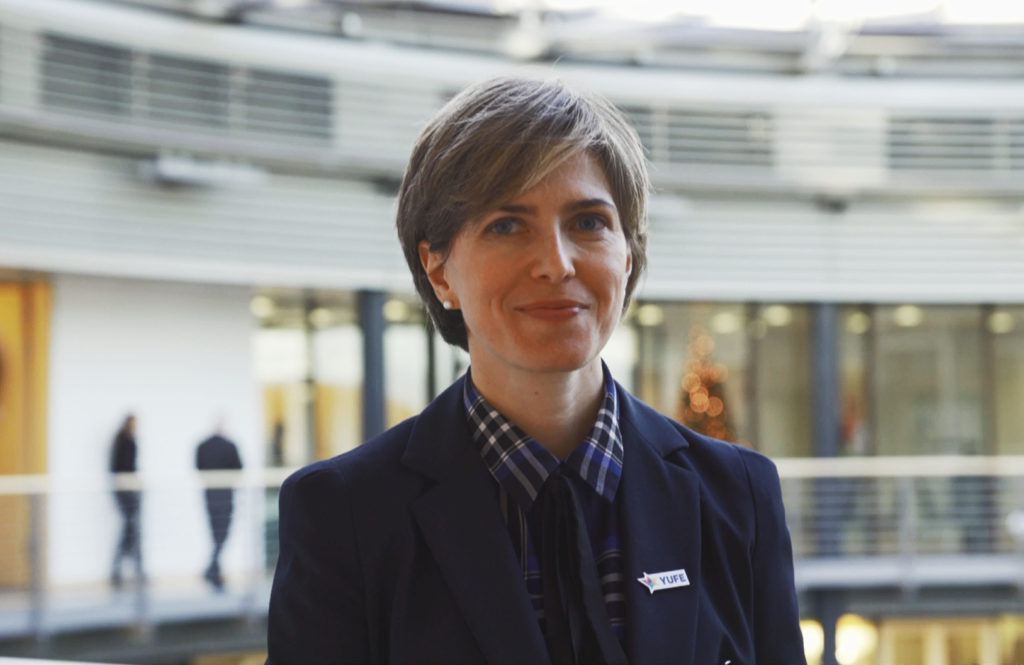
Alternative education
The above-mentioned ECIU alliance wants to experiment with alternative educational formats, offer micro-courses, micro-credits, a “competence passport”, and organise “pop-up labs.” These approaches point at diverse learning paths, where students participate in composing their curricula, and skills can be recognised across borders.
The alliance YUFE of eight “young universities” is interesting for its associated partners — the NGO Kiron that builds an online learning platform for refugees, the Adecco staffing agency, the testing organisation ETS Global, and a European association of small and medium-sized enterprises.
An interesting plan of YUFE is furnishing special homes where students can live for free during their stay and in close proximity with local residents.
EC2U, hoping to be successful in the second round, also puts emphasis on community connections. “Our ambition,” says Thilly, “is to deepen the connection with the local communities of the cities we are rooted in.
“We want to involve the municipalities and citizens into the university life, for instance through open conferences, workshops and summer schools.”
Coïmbra and Poitiers have already started by linking their students’ music and arts festivals and by setting up support schemes for young student artists aimed at improving their professional integration.
This article was first published in The Pie News, on November 15, 2019

ESNA European Higher Education News
Bülowstr. 90
10783 Berlin
Chief Editor: Tino Brömme
contact@universitiesunited.eu
+49 163 7177347